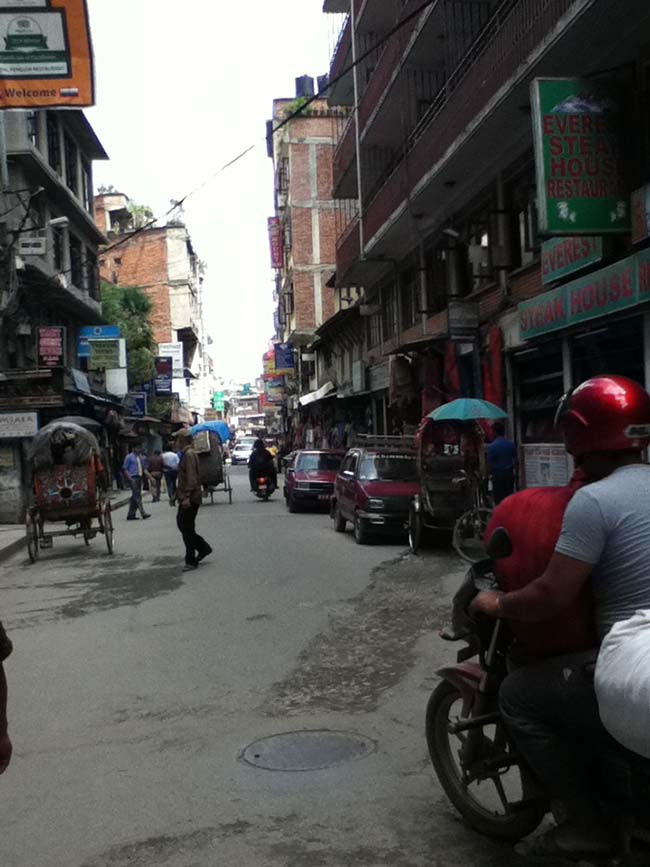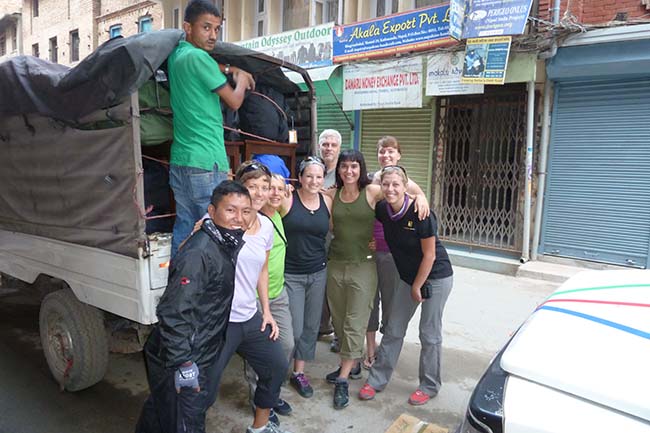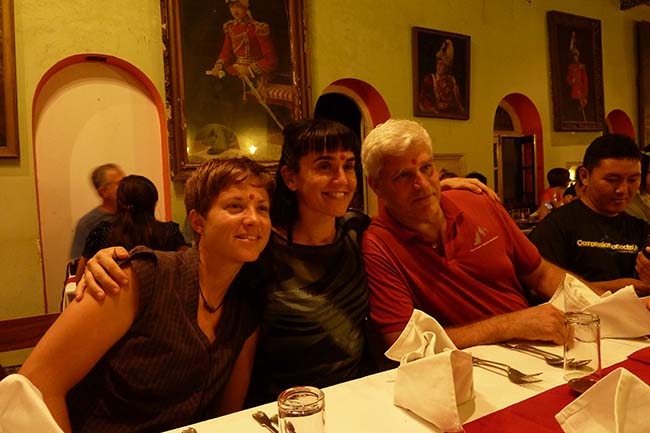
In that instant, when you’re sandwiched between a motor bike on your right, its passengers shirt tail grazing your arm, a gutter filled with unidentifiable sludge on your left, and an oncoming taxi crammed with 12 Nepalese wildly speeding toward you, you start to re-evaluate the meaning of chaos.
How do these millions of people survive in the streets of Kathmandu with no road lines, lights, stop signs or any apparent rules of the road?Cars, vans, bicycles, pedestrians, tuk-tuks and animals all playing a calculated game of frogger. It’s fastinating to watch – unnerving at times- but strangely beautiful.
I’ve learned to enjoy the thrill of going on a harrowing taxi ride, like a child enjoying rollercoasters….or a fight against incontinence!

It occurs to me that perhaps why there are not many accidents (that I’ve seen) is because people are in the flow of the moment here. Not generally distracted by phones, eating in the car, putting on make-up – all the things I see far too frequently in the USA. Biking around Portland I get to watch many drivers – and a shocking number are not actually looking at the road. It’s insanity! Maybe the comfort of road lines, lights, signs has put us on auto-pilot. Our ability to take in our surroundings, to be sharp and reactive, declines. We kill people because we can’t wait to send a text?! WHAT!?
Maybe it’s love that saves lives and prevents accidents in Nepal. I have been reading the book Shantaram, a story about an Australian fugitive who escapes from prison to the slums of India. In the story, a character explains why millions of people can manage to live in relative peace together in India is because no one loves like Indians. It’s this collective love for each other that keeps people from freaking out over the claustrophobic conditions, lack of resources and general chaos. I believe this law of love, if you will, applies in Nepal.
Nothing is done alone here, potentially using the toilet is your one moment of precious privacy…potentially. People live with multiple generations of family. They walk, shop, eat, laugh, yell, cry, smoke, drink, sit on stoops together. Contrast this to the typical American, for whom it can be a struggle to car pool with another person. There’s an ingrained sense of independence in Americans. I can do this, not we can do this. Perhaps the Nepalese culture of sharing, of interdependence, plants the seeds for love to grow. I have come to know the warm love of community in Kogate, being immediately embraced as a sister and daughter into my host family. My walk to the clinic each morning is enriched by a “Namaste!”, a smile, a familiar nod. I feel as cared for by them as, I hope, they feel cared for through my work.

There are millions of people and animals, moving as an amoeba, depending upon each other for survival. Horns blaring here and there, not out of anger, but seemingly (again this is not my culture, so I’m speculating) to alert another of your presence. “Hey! My taxi is 1 inch from your foot, excuse me, I don’t want to crush you!”. A courtesy. When horns blare in the U.S. they’re usually followed by a violent gesture, yelling, or at least some dramatic facial gestures from the driver. I am thankful horn on horn violence is a rarity in Portland :)
So next time I’m feeling late for work, stressed about the pace of traffic, ruffled by the inevitable obstacles set before me, I’ll try to be part of the ameoba. Give thanks for the protective bubble of my car, the safety of the sidewalk, the rules of the road that, theorically, allow me to put on make-up while driving. But of course I won’t! ---Amanda Johnson











